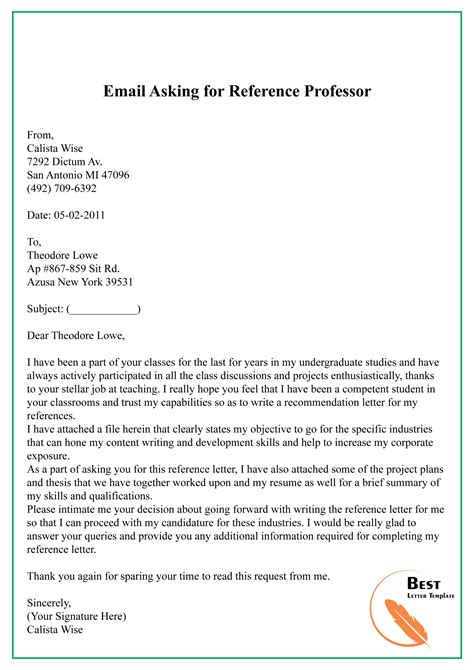Requesting References: Sample Letters & Emails In English

Asking for references can be a daunting task, especially if you’re not sure how to do it professionally. However, references are an important part of any job application, as they provide potential employers with an insight into your work ethic, personality, and skills. In this post, we’ll provide you with a detailed guide on how to request references, including sample letters and emails that you can use as templates.
Why Are References Important?
Before we dive into the specifics of requesting references, let’s first discuss why they are important. References are a way for potential employers to verify your employment history, skills, and accomplishments. They can also provide insight into your character and work ethic, which can be just as important as your qualifications.
References can help you stand out from other candidates and give you an edge in the hiring process. They can also help you build a network of professional contacts that can be valuable throughout your career.
When Should You Request References?
You should start thinking about references as soon as you begin your job search. It’s important to have a list of references ready to go in case a potential employer requests them. However, you should only provide references when asked, as it can be seen as unprofessional to offer them unsolicited.
When you do provide references, make sure they are relevant to the position you are applying for. For example, if you’re applying for a job in marketing, it would be more helpful to provide references from previous marketing jobs rather than from a retail job you had in college.
How to Request References
Now that we’ve covered the basics, let’s get into the specifics of how to request references. There are two main ways to do this: through a letter or through an email. We’ll provide you with sample templates for both below.
Requesting References via Letter
Dear [Reference Name],
I hope this letter finds you well. I am currently in the process of applying for a [position] at [company], and I was hoping that you would be willing to provide a reference on my behalf.
As you know, I worked with you at [previous company] for [length of time]. During that time, I gained valuable experience in [specific skills or accomplishments]. I believe that your reference would be a valuable asset in my job search.
If you are willing to provide a reference, please let me know and I will send you the necessary information. If you have any questions or concerns, please don’t hesitate to reach out to me.
Thank you for your time and consideration.
Sincerely,
[Your Name]
Requesting References via Email
Subject: Request for Reference
Dear [Reference Name],
I hope this email finds you well. I am currently in the process of applying for a [position] at [company], and I was hoping that you would be willing to provide a reference on my behalf.
As you know, I worked with you at [previous company] for [length of time]. During that time, I gained valuable experience in [specific skills or accomplishments]. I believe that your reference would be a valuable asset in my job search.
If you are willing to provide a reference, please let me know and I will send you the necessary information. If you have any questions or concerns, please don’t hesitate to reach out to me.
Thank you for your time and consideration.
Sincerely,
[Your Name]
FAQs
What should I include in my request for references?
You should include your name, the position you are applying for, and a brief explanation of why you are requesting the reference. You should also provide the reference with any necessary information, such as the job description or your resume.
How many references should I provide?
Most job applications will ask for three references. However, it’s always a good idea to have more than three on hand in case a potential employer requests additional references.
Who should I ask for references?
You should ask people who know you well and can speak to your skills and work ethic. This can include former managers, colleagues, or professors.
What if I don’t have any professional references?
If you don’t have any professional references, you can ask personal references, such as friends, family members, or volunteer coordinators. However, make sure you ask someone who can speak to your character and work ethic, even if they haven’t worked with you in a professional capacity.
What should I do if a reference declines?
If a reference declines, don’t take it personally. There could be a variety of reasons why they can’t provide a reference, such as company policy or a lack of time. Simply thank them for their time and move on to your next potential reference.
Requesting references can be nerve-wracking, but it’s an important part of the job application process. By following the tips and templates provided in this post, you’ll be well on your way to securing the references you need to land your dream job.
